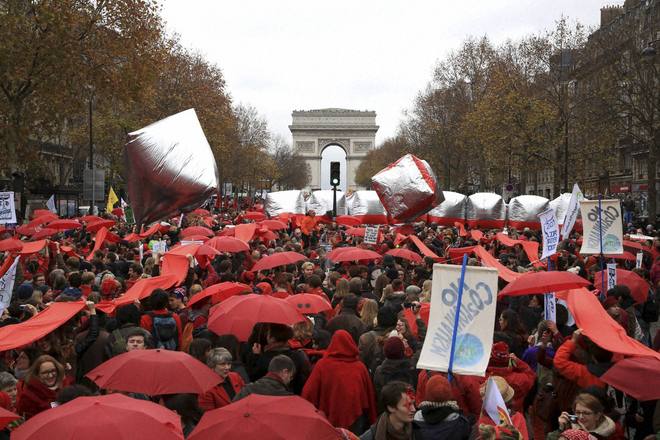Deal on temperature effective from 2020 | Rich nations promise $100 bn/year

Climate activists demonstrate with red umbrellas in Paris on Saturday. AP/PTI
Le Bourget, December 12
What the deal says
- Hold rise in global average temperature to ‘well below 2 °C above pre-industrial levels’
- Rich nations must maintain $100 bn/year funding pledge beyond 2020, and use it as a ‘floor’ for further support agreed by 2025
- Nations will have to reach a peak in greenhouse emissions ‘as soon as possible’ and achieve a balance ‘by the second half of this century’
- First ‘global stocktake’ in 2023 and every five years thereafter unless otherwise decided
- Lists existing international mechanism to deal with unavoidable losses and damages caused by climate change
- No mention of carbon markets, nor of the possibility of carbon penalties for aviation & shipping
Text accepted by all
- US’ climate envoy Todd Stern said they will agree to the final draft. The G77 bloc of 134 developing nations, including China, also gave their nod to the text
‘A fair arrangement’
A landmark climate change deal was
tonight clinched with the approval of India, China and the US, after days of
tough negotiations here with the legally-binding pact seeking to limit global
warming to "well below" 2° Celsius and committing $100 billion a year
from 2020 to help developing nations.
The target of well below 2° Celsius
and even more ambitious 1.5° Celsius was originally expected not to be to the
liking of developing countries like India and China who are major emitters on
account of industrialisation but Environment Minister Prakash Javadekar was
effusive in his welcome of the 31-page document.
On the crucial financing issue,
developing countries agreed to muster at least $100 billion a year from 2020 to
help developing nations. However, following US objections, it was not included
in the legally binding section of the deal.
Ending nearly a fortnight of
gruelling UN negotiations, French Foreign Minister Laurent Fabius banged the
gavel to announce that the Paris agreement has been adopted, marking consensus
among the ministers, who stood for several minutes to clap. "I see the
room, I see the reaction is positive, I hear no objection. The Paris climate
accord is adopted," Fabius declared.
The deal, to take effect from 2020,
ends decades-long rows between rich and poor nations over how to carry out what
will be a multi-trillion-dollar effort to cap global warming and deal with
consequences already occurring.
The Paris accord sets a target of
limiting warming of the planet to "well below" 2.0 degrees Celsius
compared with the Industrial Revolution, while aiming for an even more
ambitious goal of 1.5 degrees Celsius.
Earlier, French President Francois
Hollande had called Prime Minister Narendra Modi in an apparent bid to persuade
India to go with the deal.
Reacting to the final draft,
Javadekar had earlier told the media that the differentiation between developed
and developing countries, which India had been demanding, was mentioned across
all the pillars of action including mitigation, adaptation, finance and access
to technology.
Terming it
as an "important achievement" for India, Javadekar had said that
"sustainable lifestyles and climate justice" which have been espoused
by it also get a mention in the final 31-page draft. — PTI